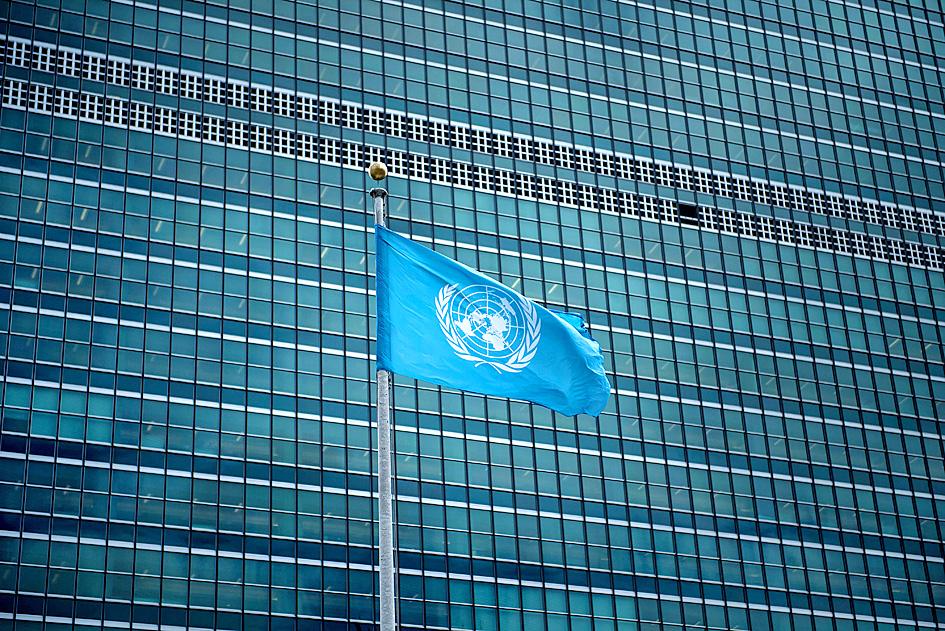Taiwan and the US on Friday held a high-level meeting on expanding Taiwan’s participation at the UN and other international organizations so that it could join efforts to tackle global challenges.
The virtual meeting, attended by officials from the Ministry of Foreign Affairs and the US Department of State, focused on helping Taiwan participate meaningfully at the UN.
The discussion also focused on bolstering Taiwan’s ability to use its expertise to address global challenges, including public health, the environment and climate change, as well as economic cooperation, according to news releases issued by both sides.

Photo: AFP
US officials reiterated Washington’s commitment to Taipei’s meaningful participation at the WHO and the UN Framework Convention on Climate Change, and discussed ways to highlight Taiwan’s ability to contribute on a wide range of issues, the department said.
They lauded the significant expansion this year of the Global Cooperation and Training Framework (GCTF), demonstrating Taiwan’s willingness and capability to address global challenges through multilateral collaboration, it said.
The GCTF was launched by Taiwan and the US in June 2015 to help bring Taiwan’s expertise to the global stage and promote multilateralism, amid Beijing’s efforts to limit Taiwan’s international participation.
Japan joined the platform in 2019 as a full partner. Since then, a number of European countries, as well as Australia, have also participated in GCTF events.
During the virtual meeting, Ministry of Foreign Affairs Secretary General Lily Hsu (徐儷文) expressed gratitude for the US’ long-term support of Taiwan, adding that the government would continue to contribute to the international community in a professional and practical manner.
Other attendees at the meeting included Deputy Representative to the US Wang Liang-yu (王良玉), American Institute in Taiwan Deputy Director Jeremy Cornforth, US Department of State Acting Principal Deputy Assistant Secretary for International Organizations Hugo Yon, Deputy Assistant Secretary for China, Taiwan and Mongolia Rick Waters, and deputy assistant secretaries for international organization affairs Nerissa Cook and Jane Rhee.
Taiwan, officially called the Republic of China, left the UN in 1971 when the People’s Republic of China took its place, and has since been excluded from the UN General Assembly and the organization’s special agencies.
Beijing has ramped up pressure on the UN and its affiliated agencies to prevent Taiwan’s participation in the global body, citing UN Resolution 2758.
In the resolution, adopted on Oct. 25, 1971, the UN General Assembly decided to “expel forthwith the representatives of [then-president] Chiang Kai-shek (蔣介石) from the place which they unlawfully occupy at the United Nations and in all the organizations related to it.”
Waters, during a virtual talk hosted by the German Marshall Fund of the United States, said Beijing has inaccurately interpreted the resolution to exclude Taiwan from playing a role at the UN and its affiliates.
Wang echoed the view, saying on Thursday that it is “actually a perfect textbook example of how China uses its influence to exert its will over the UN system.”

MAKING WAVES: China’s maritime militia could become a nontraditional threat in war, clogging up shipping lanes to prevent US or Japanese intervention, a report said About 1,900 Chinese ships flying flags of convenience and fishing vessels that participated in China’s military exercises around Taiwan last month and in January have been listed for monitoring, Coast Guard Administration (CGA) Deputy Director-General Hsieh Ching-chin (謝慶欽) said yesterday. Following amendments to the Commercial Port Act (商港法) and the Law of Ships (船舶法) last month, the CGA can designate possible berthing areas or deny ports of call for vessels suspected of loitering around areas where undersea cables can be accessed, Oceans Affairs Council Minister Kuan Bi-ling (管碧玲) said. The list of suspected ships, originally 300, had risen to about 1,900 as

DAREDEVIL: Honnold said it had always been a dream of his to climb Taipei 101, while a Netflix producer said the skyscraper was ‘a real icon of this country’ US climber Alex Honnold yesterday took on Taiwan’s tallest building, becoming the first person to scale Taipei 101 without a rope, harness or safety net. Hundreds of spectators gathered at the base of the 101-story skyscraper to watch Honnold, 40, embark on his daredevil feat, which was also broadcast live on Netflix. Dressed in a red T-shirt and yellow custom-made climbing shoes, Honnold swiftly moved up the southeast face of the glass and steel building. At one point, he stepped onto a platform midway up to wave down at fans and onlookers who were taking photos. People watching from inside

Japan’s strategic alliance with the US would collapse if Tokyo were to turn away from a conflict in Taiwan, Japanese Prime Minister Sanae Takaichi said yesterday, but distanced herself from previous comments that suggested a possible military response in such an event. Takaichi expressed her latest views on a nationally broadcast TV program late on Monday, where an opposition party leader criticized her for igniting tensions with China with the earlier remarks. Ties between Japan and China have sunk to the worst level in years after Takaichi said in November that a hypothetical Chinese attack on Taiwan could bring about a Japanese

The WHO ignored early COVID-19 warnings from Taiwan, US Deputy Secretary of Health and Human Services Jim O’Neill said on Friday, as part of justification for Washington withdrawing from the global health body. US Secretary of State Marco Rubio on Thursday said that the US was pulling out of the UN agency, as it failed to fulfill its responsibilities during the COVID-19 pandemic. The WHO “ignored early COVID warnings from Taiwan in 2019 by pretending Taiwan did not exist, O’Neill wrote on X on Friday, Taiwan time. “It ignored rigorous science and promoted lockdowns.” The US will “continue international coordination on infectious